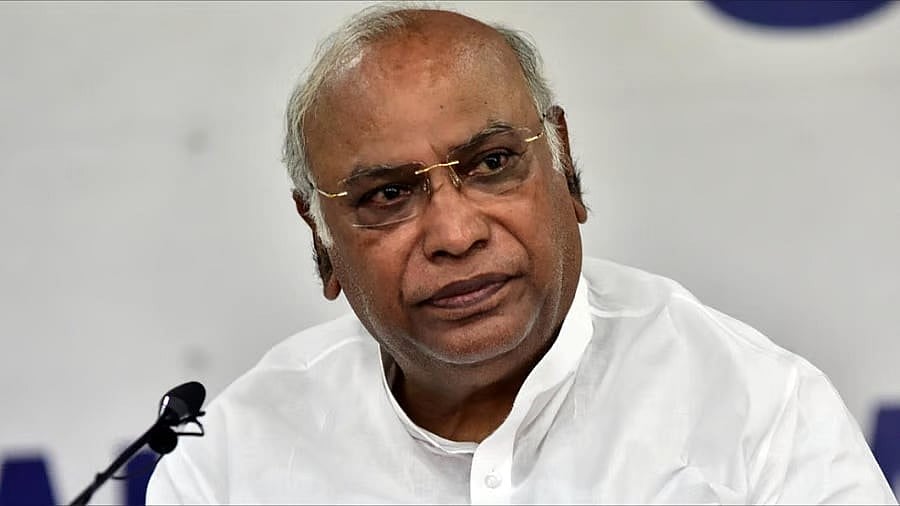
Mallikarjun Kharge.
Credit: DH File Photo
New Delhi: Reaffirming Congress’ “unshakable faith” in ‘Vande Mataram’ on the occasion marking its 150 years of existence, its president Mallikarjun Kharge on Friday accused the RSS and BJP of never singing the national song in their “shakhas or offices”.
The Congress president said the Congress, on the other hand, takes “immense pride” in both ‘Vande Mataram’ and national anthem ‘Jana Gana Mana’ and sang both with “reverence” at every party event, symbolising India’s unity and pride.
Kharge’s fresh attack on the RSS came days after he said he personally advocates a ban on the Sangh fountainhead.
In a message on the 150th anniversary of ‘Vande Mataram’, written by Bankim Chandra Chattopadhyay, he recalled that the song that appeared in the novel 'Ananthmath' was publicly sung first by Rabindranath Tagore at the 1896 Congress Session in Kolkata chaired then president Rahmatullah Sayani.
Kharge said Tagore's rendition “infused new life into the freedom struggle” and the Congress understood that the British Empire’s policy of divide and rule, manipulating religious, caste and regional identities was designed to break India’s unity. Against this, he said, ‘Vande Mataram’ rose as a “song of unflinching strength, uniting all Indians in devotion to Bharat Mata”.
Recalling several other occasions when it was sung with the Congress becoming its “proud flagbearer”, he said, “however, it is deeply ironic that those who today claim to be the self-proclaimed guardians of nationalism – the RSS and the BJP – have never sung ‘Vande Mataram’ or our national anthem ‘Jana Gana Mana’ in their shakhas or offices.”
Instead, he said, they continue to sing ‘Namaste Sada Vatsale’, a song glorifying their organisation and not the nation. Since its founding in 1925, he alleged the RSS has avoided ‘Vande Mataram’, despite its universal reverence and “not once in its texts or literature does the song find mention”.
Kharge claimed that it was a “well-known fact” that the RSS and Sangh Parivar “supported the British against Indians in the national movement, did not raise the national flag for 52 years, abused the Constitution of India, burnt effigies of Bapu (Mahatma Gandhi) and Babasaheb Ambedkar, and, in the words of Sardar Patel, were involved in Gandhiji’s assassination”.
He said both ‘Vande Mataram’ and ‘Jana Gana Mana’ are sung with “pride and patriotism as a tribute to the people of India” at every Congress gathering, big or small.
From the partition of Bengal in 1905 to the last breaths of brave revolutionaries, he said 'Vande Mataram' echoed through the land. It was the title of Lala Lajpat Rai’s publication, inscribed on Bhikaji Cama’s flag raised in Germany, and found in Pandit Ram Prasad Bismil’s Kranti Gitanjali, he said adding the British banned it “terrified by its popularity”, for it had become the "heartbeat of India’s freedom struggle”.
In 1915, Kharge recalled, Mahatma Gandhi wrote that Vande Mataram had become the “most powerful battle cry among Hindus and Musalmans of Bengal during the Partition days. It was an anti-imperialist cry. As a lad, when I knew nothing of ‘Anand Math’ or even Bankim, its immortal author, Vande Mataram had gripped me, and when I first heard it sung, it had enthralled me. I associated the purest national spirit with it…”
Twenty-three years later, he said, Jawaharlal Nehru wrote, “for more than 30 years now, the song is related directly to Indian nationalism. Such ‘songs of people’ are not tailor made neither can they be imposed on the minds of people. They attain the heights by themselves.”
The Uttar Pradesh Legislative Assembly started reciting Vande Mataram from 1927 when Purshottam Das Tandon was its Speaker and in the same year, the Congress formally recognised it as the 'national song', “reaffirming its position as a symbol of India’s unity in diversity”, he added.
